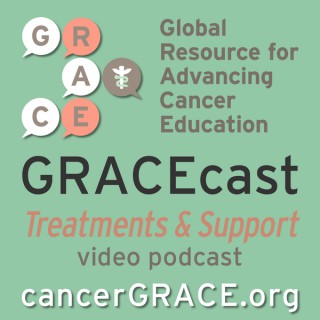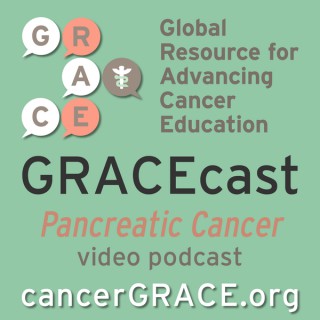GRACEcast Treatments and Support Video
Follow GRACEcast Treatments and Support VideoOncology experts summarize current and emerging issues in cancer management for patients and caregivers. Information from the Global Resource for Advancing Cancer Education (GRACE) helps people to become informed partners in their care.
cancerGRACE - H. Jack West, MD
- Jan 21, 2016 LATEST EPISODE
- infrequent NEW EPISODES
- 16m AVG DURATION
- 37 EPISODES
More podcasts from cancerGRACE - H. Jack West, MD
Latest episodes from GRACEcast Treatments and Support Video

Dr. Craig L. Slingluff, University of Virginia, discusses novel approaches to immunotherapy, including adoptive T-cell therapy, personalized cancer vaccines and personalized selection of immune therapies.

Dr. Mario Sznol, Yale School of Medicine, provides a detailed description of the mechanism of action of immunotherapy agents and discusses early data on the use of combination therapies.

Dr. Julie Brahmer, Johns Hopkins University, discusses the use of biomarker testing and mutational burden to select patients for specific immunotherapies in lung cancer, renal cell carcinoma and melanoma.

Dr. Mario Sznol, Yale School of Medicine, provides an overview of melanoma and its treatment, and discusses current melanoma immunotherapies and other agents under investigation.

Dr. Julie Brahmer, Johns Hopkins University, discusses immunotherapies for NSCLC and SCLC, analyzes the relevant trial data and addresses the unique side effects of these therapies.

Dr. James Gulley, National Cancer Institute, discusses immunotherapies for genitourinary cancers, including recent trial results. He also addresses early data which may indicate that using immunotherapy sooner may benefit patients.

Terrie Schmith, a stage IV melanoma survivor, describes her battle with the disease and her successful treatment with pembrolizumab.

Dr. Evan J. Lipson, Johns Hopkins University, discusses the incidence and treatment of side effects of immunotherapy and compares them to chemotherapy toxicities.

The Current Role of Immunotherapy in the Treatment of Patients with Cancer
Dr. Michael Atkins, Georgetown-Lombardi Comprehensive Cancer Center, details the positive trial results for immunotherapy in a wide variety of cancers. He also describes current trials of combination regimens and the future of immunotherapy.

Dr. James Gulley, National Cancer Institute, gives an overview of the immune system and describes the mechanism of action of immunotherapy agents, as well as results from clinical trials.

Immunotherapy Forum Video #30: Immunotherapy for cancer has rewritten the rules for what we consider a successful response to treatment. Some tumors grow before they regress. Dr. Jedd Wolchok discusses why a new measurement criteria was developed.

Immunotherapy Forum Video #29: In part 2 of 2, Dr. Jason Luke discusses treating cancer with immunotherapy and another drug, such chemotherapy or targeted therapies, as well as what we know about biomarkers that predict if an immunotherapeutic will work.

Immunotherapy Forum Video #28: Doctors are still weighing the pros and cons of giving a cancer patient immunotherapy before or after resection surgery. In part 1 of 2 videos, Dr. Jason Luke details those risks and benefits.

Immunotherapy Forum Video #27: Immunotherapies work well in some, but not in others. Who benefits, and why? Dr. Sumanta (Monty) Pal explains what doctors are learning.

Questions & Answers with Drs. Topalian and Wolchok about Immunotherapy for Melanoma
Immunotherapy Forum Video #18: Drs. Topalian and Wolchok sat for a moderated Q&A with Dr. Louise Perkins from the Melanoma Research Alliance following their presentations on immunotherapy for melanoma.

Immunotherapy Forum Video #17: In Part 2 of 2 videos on this topic, Dr. Jedd Wolchok discusses side effects related to immunotherapy, combination therapies, and information about new immunotherapies currently being studied for treating melanoma.

Immunotherapy Forum Video #16: In Part 1 of 2 videos on this topic, Dr. Jedd Wolchok provides a history of one of the first immunotherapy drugs, Yervoy (ipilumumab), and the evidence that led to its approval.

Immunotherapy for Melanoma, Pt. 2: Immune Checkpoints & the Drugs That Block Them
Immunotherapy Forum Video #15: In Part 2 of 2 videos on this topic, Dr. Suzanne Topalian discusses the immunotherapy drugs that are currently approved for the treatment of melanoma as well as future treatments on the horizon.

Immunotherapy Forum Video #14: In Part 1 of 2 videos on this topic, Dr. Suzanne Topalian provides a background on melanoma in the United States and how immunotherapy treatment for it has progessed over the past three decades.

Immunotherapy Forum Video #12: In Part 2 of 2 videos on this topic, Dr. Michael Atkins explains why immunotherapy appears to be more effective in such cancers as melanoma, lymphomas, and kidney, lung, bladder, and head and neck cancers.

Immunotherapy Forum Video #12: In Part 2 of 2 videos on this topic, Dr. Michael Atkins explains why immunotherapy appears to be more effective in such cancers as melanoma, lymphomas, and kidney, lung, bladder, and head and neck cancers.

Immunotherapy Forum Video #11: In Part 1 of 2 videos on this topic, Dr. Michael Atkins explains why immunotherapy appears to be more effective in such cancers as melanoma, lymphomas, and kidney, lung, bladder, and head and neck cancers.

Immunotherapy Forum Video #10: "For all of the scholarly individuals here to give you the science, I'm here to give you the proof," is how stage IV melanoma patient Rusty Cline kicks off the story of his remarkable response to immunotherapy.

Immunotherapy Forum Video #9: In Part 2 of 2 videos on this topic, oncology nurse Dr. Marianne Davies discusses the side effects that cancer patients who undergo immunotherapy treatment may experience and how to minimize them.

Immunotherapy Forum Video #8: In Part 1 of 2 videos on this topic, oncology nurse Dr. Marianne Davies discusses the side effects that cancer patients who undergo immunotherapy treatment may experience and how to minimize them.

Questions & Answers with Drs. Pardoll, Hellmann, and Luke; Moderated by Dr. West
Immunotherapy Forum Video #7: Drs. Pardoll, Hellman, and Luke sat for a moderated Q&A with Dr. Jack West.

Immunotherapy Forum Video #6: In Part 2 of 2 videos on this topic, Dr. Jason Luke from the University of Chicago talks about the types of immunotherapy currently in use for melanoma, kidney cancer, and lung cancer and how they are given to patients.

Immunotherapy Forum Video #5: In Part 1 of 2 videos on this topic, Dr. Jason Luke from the University of Chicago talks about the types of immunotherapy currently in use for melanoma, kidney cancer, and lung cancer and how they are given to patients.

Immunotherapy Forum Video #4: In Part 2 of 2 videos on this topic, Dr. Matthew Hellmann from the Memorial Sloan Kettering Cancer Center discusses the century-long history of attempting to treat cancer with immunotherapy.

Immunotherapy Forum Video #3: In Part 1 of 2 videos on this topic, Dr. Matthew Hellmann from the Memorial Sloan Kettering Cancer Center discusses the century-long history of attempting to treat cancer with immunotherapy.

Immunotherapy Forum Video #1: In Part 1 of 2 videos on this topic, Dr. Drew Pardoll from the Kimmel Cancer Center at Johns Hopkins explains what immunotherapy is and how it helps cancer patients live longer - many for five years or more.

Cancer Drug Pricing's Game of Chicken: MSKCC Investigators Make a Drug Company Blink
Dr. H. Jack West, medical oncologist from Swedish Cancer Institute in Seattle, WA, discusses recent developments around pricing and value for Zaltrap (ziv-aflibercept) triggered by a New York Times op-ed piece by MSKCC physicians.

Dr. Stephanie Harman, Director of Palliative Care at Stanford University Medical Center, reviews the challenges of depression and fatigue related to cancer, and treatment approaches for these issues.

Dr. Stephanie Harman, Director of Palliative Care at Stanford University Medical Center, reviews nausea in the context of cancer, as well as the range of treatment options to manage it.

Dr. Stephanie Harman, Director of Palliative Care at Stanford University Medical Center, reviews the main types of pain, the range of treatment options for it, and myths and realities of treating patients with opioids for pain management.

Dr. Stephanie Harman, Director of Palliative Care at Stanford University Medical Center, introduces the concept and goals of palliative care, particularly with a focus on oncology.

Managing Skin-Related Side Effects from Cancer Treatments, with Dr. Mario Lacouture (video)
Dr. Mario Lacouture, expert dermatologist at Memorial Sloan-Kettering Cancer Center in NYC, reviews management of side effects related to skin, hair, and nails for patients on treatments for cancer treatments that cause dermatologic complications.

















